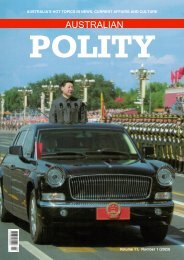Australian Polity, Volume 9 Number 3 - Digital Version
Australia's hot topics in news, current affairs and culture
Australia's hot topics in news, current affairs and culture
Create successful ePaper yourself
Turn your PDF publications into a flip-book with our unique Google optimized e-Paper software.
tip from responsible competition to conflict.” He went
on to say “The authoritarians of the world, they seek
to proclaim the end of the age of democracy, but they
are wrong.” These are nice sentiments, but do they
engender confidence in a resolute preparedness to
defend democracy? Significantly, the Secretary of
State, Antony Blinken, made a short intervention at the
meeting on ASEAN Foreign Ministers on September 23 to
announce that the US will release a “new, comprehensive
Indo-Pacific Strategy” in fall which “builds on our shared
vision for a free, open, interconnected, resilient, and
secure region.” He stressed that “ASEAN is central to the
architecture of the Indo-Pacific region and its critical to
our own stability, economic opportunity, and vision for
a rules-based international order.”
Australia must play a significant role in partnership with
other nations in ensuring the US will continue to “bear
the burden of the long twilight struggle.”
Strengthening Sanctions
The Australian Government agreed in August to introduce
a new thematic sanctions regime targeting serious human
rights violations and abuses, and serious corruption. This
regime will be part of broader reforms to the existing
autonomous sanctions framework.
The decision arose from a unanimous report of the
Parliament’s Joint Standing Committee on Foreign Affairs,
Defence and Trade, Criminality, corruption and impunity:
Should Australia join the Global Magnitsky movement?
It is a significant strengthening of the nation’s human
rights framework in line with legislation introduced in
several other jurisdictions, including the US, Canada,
the UK and Europe.
There has been a growing awareness that country- or
sector-wide sanctions, such as Australia currently has
enacted, often impact innocent parties disproportionately,
and a new way to instigate consequences for
unacceptable behaviour is required. Kleptocrats and
other perpetrators of serious human rights abuse and
corruption have transferred assets to enjoy in Western
countries with safe, stable democracies and secure
financial systems, such as Australia.
While it would be preferable for the perpetrators of
human rights abuse and corruption to face penalties in
their home countries, and reparations made to victims,
this is often not what happens.
Australians, and their families, have been threatened,
and human rights abusers have invested the proceeds
of their crimes in Australia, gaining access to Australian
education and healthcare systems. Elsewhere, targeted
sanctions legislation has allowed governments to tackle
this issue. Travel bans and seizing assets has prevented
perpetrators from enjoying, with impunity, the proceeds
of their crimes, and most likely deterred other would-be
perpetrators from attempting to do the same.
Although the Australian Government has chosen to
expand the existing sanctions framework rather than
introduce a separate Magnitsky-type law, the substance
of the Committee’s report has been accepted.
The legislation will give Australia the option to impose
travel bans and freeze assets. Working in concert with
other countries, we will close the gap of opportunity for
perpetrators, and ensure there are consequences in
cases where they were otherwise lacking.
Notably, the Government response included “malicious
cyber activity” in the range of situations which could give
rise to sanctions. This was a not a matter canvassed with
the Committee but is a welcome addition to the scope
of the new regime.
The Government response differed from the Committee’s
proposals about an independent body to consider
possible sanctions and advise the Government. It also
rejected the proposal for a ‘watch list’ of people being
considered for sanctioning, noting that this might allow
people to avoid the regime.
The Government has indicated that the new thematic
criteria for the consideration of sanctions will be focussed
on three particular rights relating to physical integrity:
the right to life; the right to be free from slavery, not to
be held in servitude or be required to perform forced
or compulsory labor; and the right not to be subjected
to torture or cruel, inhuman or degrading treatment or
punishment. In addition, the regime will also focus on
serious corruption.
8 Australian Polity





